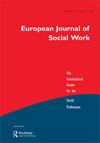从布迪厄启发的实地视角看一线自由决定权:挪威对生病员工的激活措施的民族志案例研究
IF 1.6
3区 社会学
Q2 SOCIAL WORK
引用次数: 0
摘要
本文章由计算机程序翻译,如有差异,请以英文原文为准。
Frontline discretion from a Bourdieu-inspired field perspective: an ethnographic case study of a Norwegian activation measure for sick-listed employees
ABSTRACT Frontline work is increasingly undertaken in multi-stakeholder settings, indicating a need to revisit issues of frontline discretion. This ethnographic case study, based on an activation measure for sick-listed employees in Norway, applies a Bourdieu-inspired field analysis of frontline discretion. We approach frontline discretion in the Norwegian Labour and Welfare Administration (NAV) as comprised by ‘position-takings’ in an available space of possibilities in the field of work reintegration. A key feature of this field is that stakeholders employ opposing forms of capital: the NAV caseworker employs activation capital; sick-listed employees use individual or client capital; client employers draw on economic capital; and the clients’ general practitioners employ medical expertise capital. We find that NAV caseworkers undertake three specific position-takings in manoeuvring the other forms of stakeholder capital: nudging and negotiating with and between stakeholders; legitimising NAV’s interests and demands; and making other stakeholders accountable. Notably, frontline discretion is constituted in the configuration of the forms of stakeholder capital, including that of their own organisation, which requires administration and compromises between them. Our theoretical contribution is that an administrative form of capital becomes symbolic, potentially incorporating frontline workers’ future professional habitus.
求助全文
通过发布文献求助,成功后即可免费获取论文全文。
去求助
来源期刊

European Journal of Social Work
SOCIAL WORK-
CiteScore
3.50
自引率
20.00%
发文量
96
期刊介绍:
The European Journal of Social Work provides a forum for the social professions in all parts of Europe and beyond. It analyses and promotes European and international developments in social work, social policy, social service institutions, and strategies for social change by publishing refereed papers on contemporary key issues. Contributions include theoretical debates, empirical studies, research notes, country perspectives, and reviews. It maintains an interdisciplinary perspective which recognises positively the diversity of cultural and conceptual traditions in which the social professions of Europe are grounded. In particular it examines emerging European paradigms in methodology and comparative analysis.
 求助内容:
求助内容: 应助结果提醒方式:
应助结果提醒方式:


